.
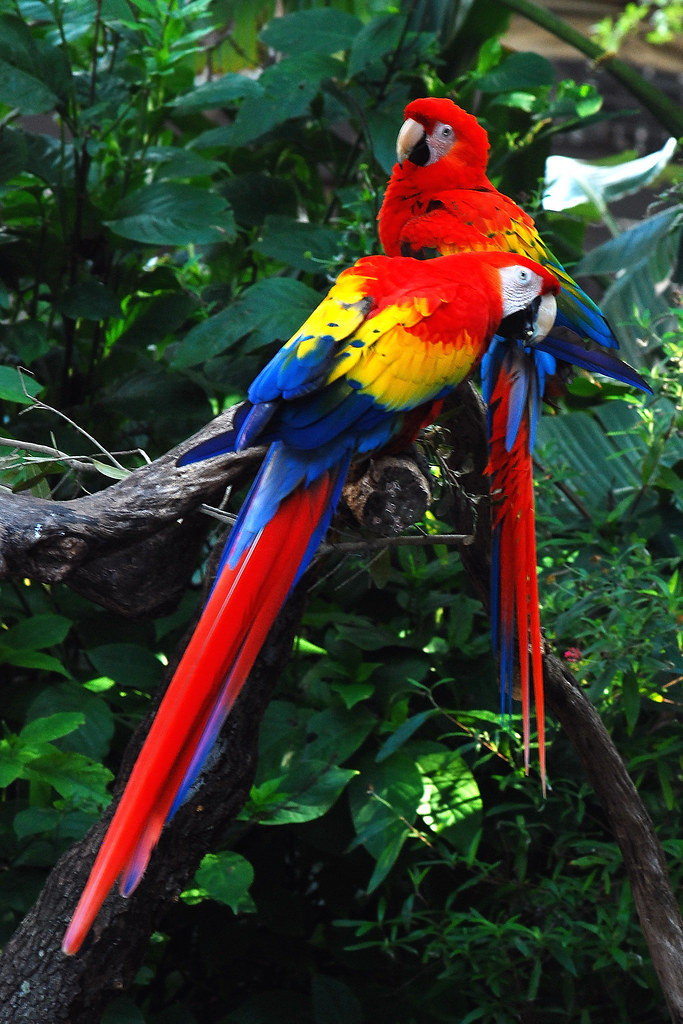
Pair of Scarlet Macaws (Ara macao): photo by Matthew Romack, 24 February 2008
for Harris Schiff
for Harris Schiff
Maybe it is possible that we were all young once. And that she would have loved us then. But the trouble is, at that time, she would not have been born... but even so. And we thought we were reaching up to the sky. But the sun was in our eyes. But she did not know that, how could she have known that, not yet having been born. For her, waiting there inside the realm of the purely possible, for all those Dereks, it was all pure radiance. For us it was all pure love. And the radiance... nothing but the air, the space, the love, her, us... all those light years of empty space, no make-up... the two great birds screeching outside the window, the wind moving slightly in the palms... the green depths... the infinity of our love... which she would never come to know... all we wished to do, in our hearts, was to make a nest in her heart... we hoped she would never learn English so that she would always need us to be there, teaching her, yet she would be heedless of our need, of the great selfless power of the feeling that was going out of us, toward her, beyond words, beyond ingles, beyond all palabras, beyond everything, looking up into dazzling boundless blue sky, shielding our eyes from its dangerous yet impossibly compelling magnitude, the greatest thing, the funny thing, the thing before all other things... and then she would begin to understand, and swim up toward the light with us, and all her stingrays would follow along with her, and they would be singing along with her, saying, Yeah, it's alright, ¡adelante!

Southern stingray (Dasyatis americana): photo by Albert Kok, 31 January 2008
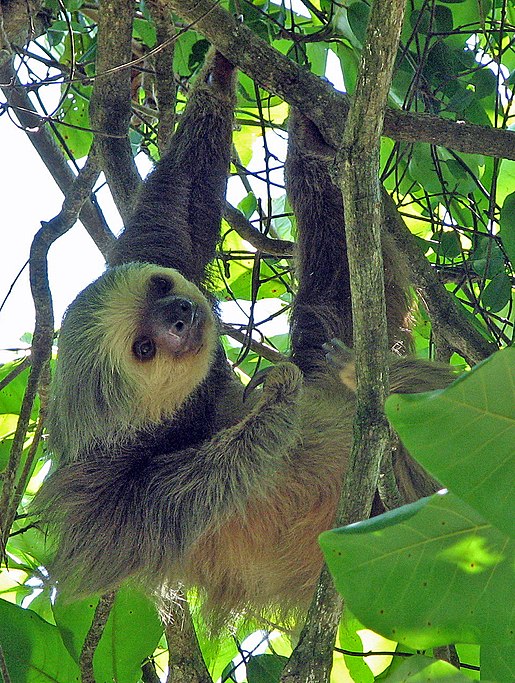
Hoffman's Two-toed sloth (Choloepus hoffmanni), Manuel Antonio National Park, Costa Rica: photo by Leyo, 2005
Angry Scarlet Macaw (Ara macao), Belize (I got too close): photo by James O'Neal Lowery, 4 April 2004; image by Sapphic, 22 March 2007

Three-wattled Bellbird (Procnia tricaruculatus) (male), Costa Rica: photo by Ryan Kozie, 13 April 2008; edit by Snowmanradio, 10 November 2010

Resplendent Quetzal (Pharomacus mocinno costaricensis) (male), Savegre, Costa Rica: photo by Jimfbleak, 27 February 2006
Resplendent Quetzal (Pharomacus mocinno costaricensis) (male), leaving nest hole, Savegre Mountain Hotel, Costa Rica: photo by Joseph C. Boone, 11 March 2012
Doris butterfly (Heliconius doris). Characteristics are two white spots on fore-wing, scalloped margin of hind wing, marginal row of small, white spots along the hind wing. The fan with fingers is orange here but can also be blue or green. Native to Costa Rica: photo by MamaGeek, 8 October 2007
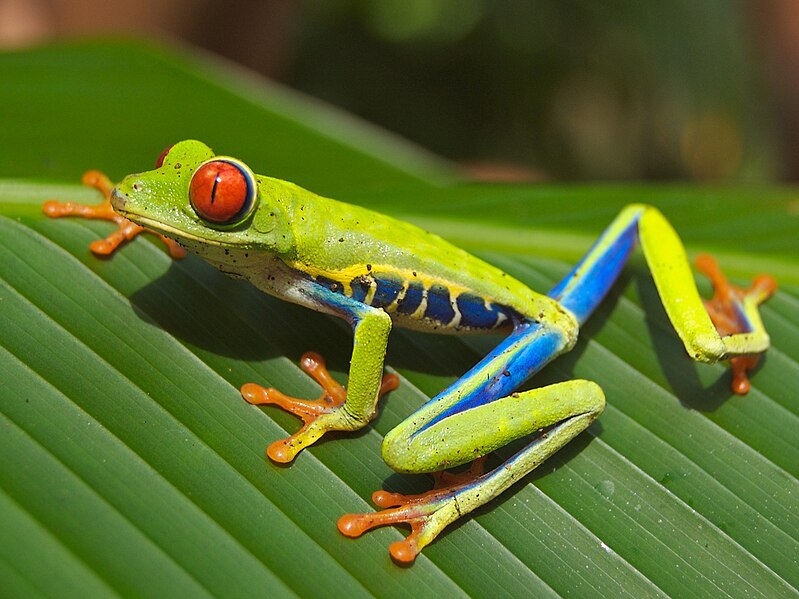
Red-eyed Tree Frog (Agalychichnis callidryas), near Playa Jaco, Costa Rica: photo by Carey James Balboa, 2007
Bradypus variegatus (Three-toed Sloth), feeding, Cahuita National Park, Costa Rica: photo by Mehlführer, 2007
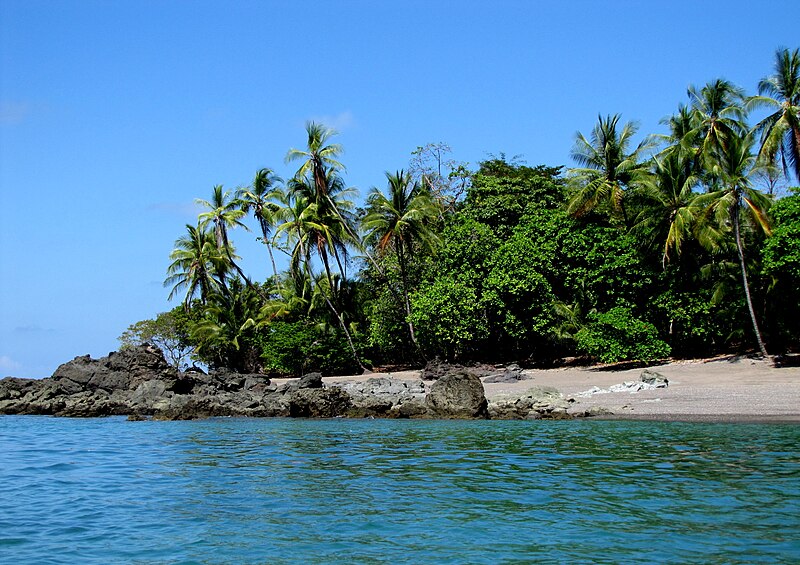
Corcovado National Park, Osa Peninsula, Costa Rica: photo by José R., 25 July 2010
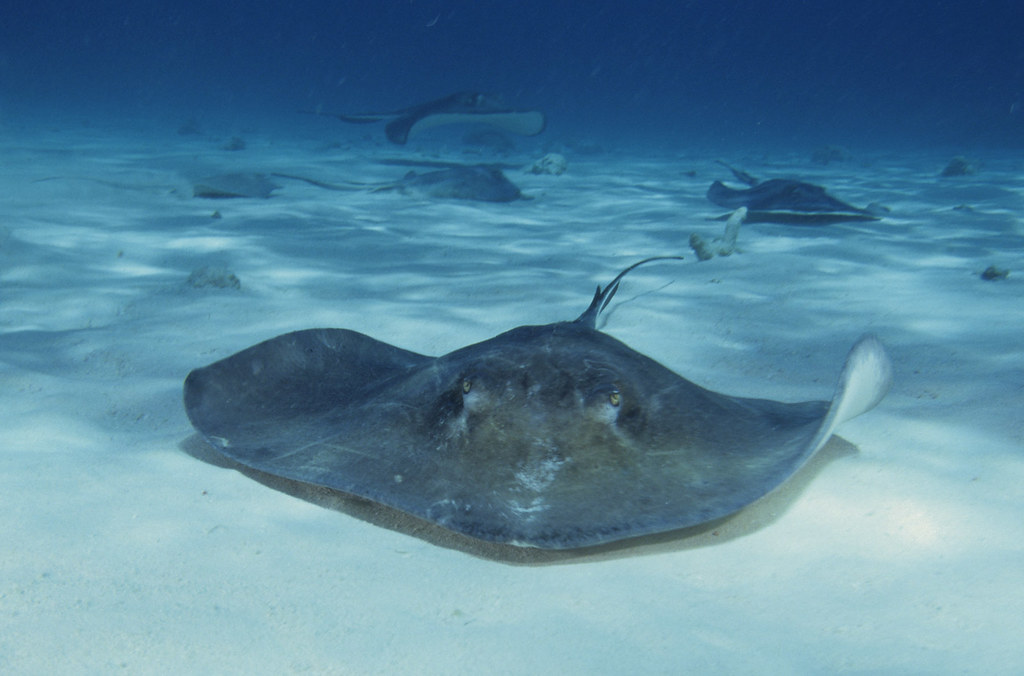
Southern stingrays (Dasyatis americana), Grand Cayman: photo by Barry Peters, 16 February 1992
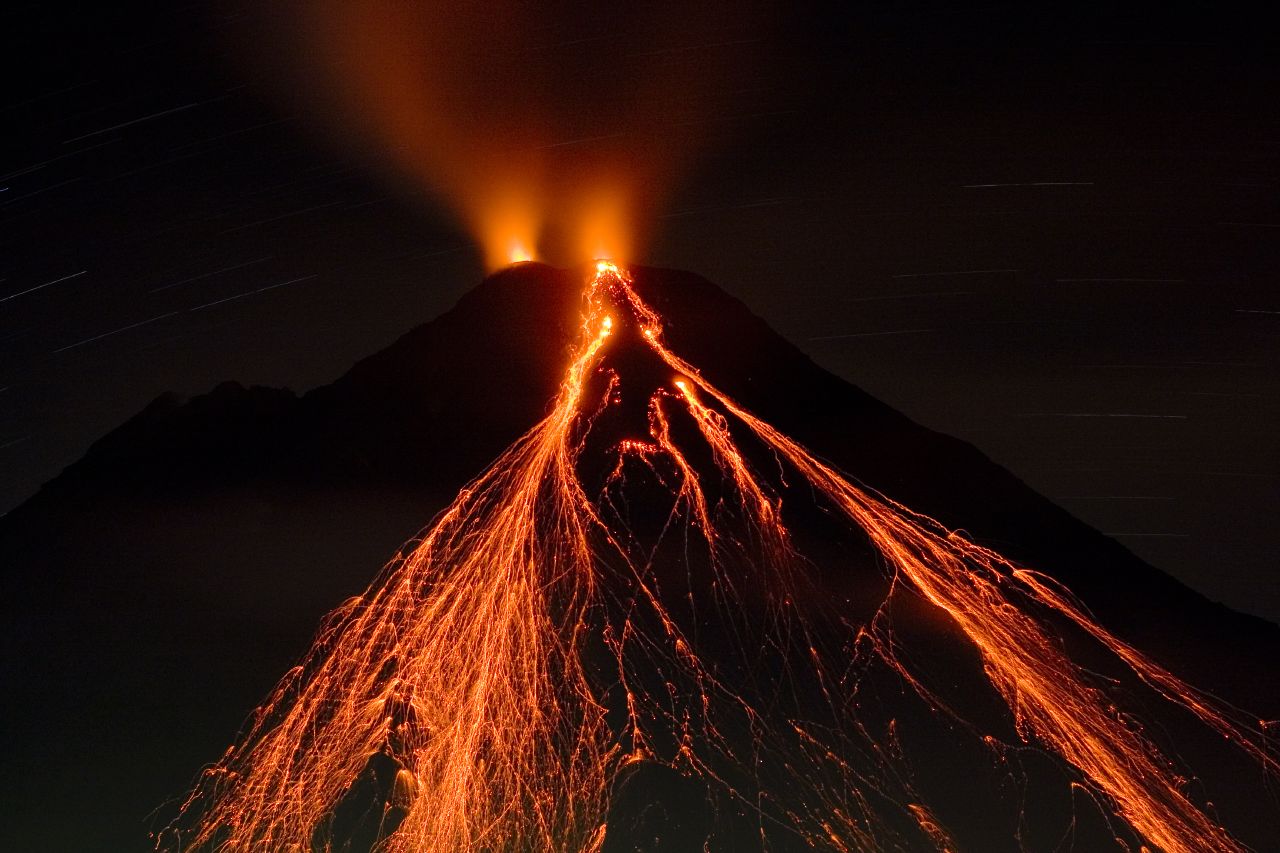
Lava flows, Arenal Volcano, Costa Rica: photo by Matthew Landry, 17 July 2008

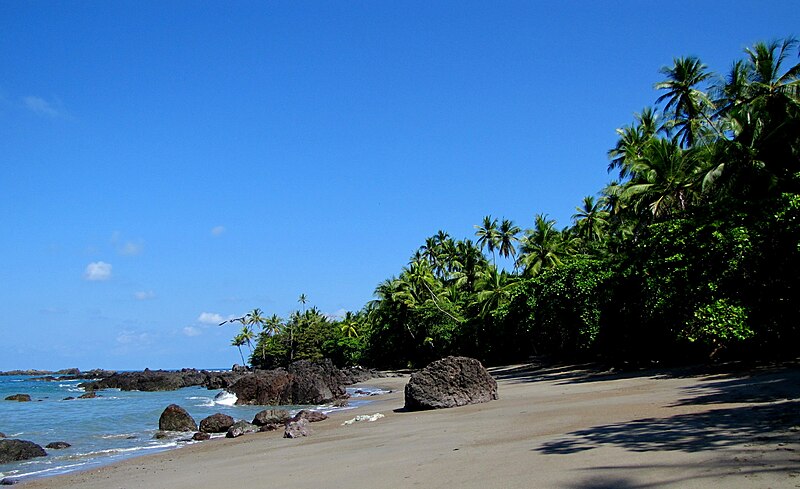




9 comments:
Since getting a great long letter from Harris last month I have been exercising Negative Capability in order to attempt to identify the screeching birds outside his beach hacienda. In the course of this study I have been eyeballing many Costa Rican beauties, of the avian variety, and auditing the very many wonderful musical songs and calls of the hundreds of bird species that make Costa Rica a green paradise of birds, as I am learning. The bird of Harris still eludes me, but the penetrating quality of its screech as he speaks of it in his letter made me wonder if this bird might not be some relation to another of the species native to this paradise of birds.
Harris dwells hard by the warm lapping southern waters, and the Three-wattled Bellbird is a creature of the mountains and mists of the Cloud Forest.
No one would ever know it was there, hid away deep in the Cloud Forest, this most Garboesque of birds, were it not for its quite amazing song. In this 90 second clip, not even a tropical thunderstorm can muffle that piercing call. It's almost as though the Three-wattled Bellbird were taking the thunderstorm as a challenge. Once the Three-wattled Bellbird hits that first note, the decibel battle is over in about an eighth of the second.
Three-wattled Bellbird, Monteverde cloud forest, Costa Rica
"Because of the secretive behavior of this bird, it is often only detected by the distinctive bell-like call given by the males. At close range, the vocalization of many in Costa Rica is heard as a complex three-part song, the "bonk" giving the bird its name ["the 'bonk' bird"]. This hollow, wooden 'bonk' is thought to be among the loudest bird calls on Earth, audible to humans from over 0.5 mi (0.80 km) away.
And this factoid gave me pause.
"Research by Donald Kroodsma on recordings archived at the Cornell Lab of Ornithology showed that the Three-wattled Bellbird is unique among members of its sub-order, in that it learns its song, rather than having the song determined by instinct, because the song changed over the years that it had been recorded."
__
Subtext:
Yeah, said It's all right
I won't forget
All the times I've waited patiently for you
And you'll do just what you choose to do
And I will be alone again tonight my dear
Yeah, I heard a funny thing
Somebody said to me
You know that I could be in love with almost everyone
I think that people are
The greatest fun
And I will be alone again tonight my dear
-- Alone Again Or: Bryan MacLean, 1966
Bryan MacLean: Alone Again Or (acoustic demo recorded 1966-67)
Arthur Lee, vocal lead on Alone Again Or: From Love: Forever Changes, 1968
The late Bryan MacLean wrote the song. The late great Arthur Lee went on performing it for many years after the breakup of their band, Love.
Arthur Lee: Alone Again Or (live on Later with Jools Holland, c 2003)
"For us it was all pure love".
Building nests.
Working with our stories of need.
Sunblind.
The bell call filling space for a brief moment.
And Arthur holed up in LA waiting for the grand moment of ending that was always coming far too slowly.
A exquisite gift for Harris.
BIRD SONG
I envy Olivier Messiaen
stalking early mornings in the
fields of France, in a
magazine article I saw
years ago, with a
notebook, notating
bird song!
He is said to be able to orchestrate birdcalls
just by hearing them, write those
trills and
watery runs with
tiny black dots on lines a musician back in a
musty room might play on his clarinet!
Notes, out of
tree-wilderness, out of
bird language, one to
another for
whatever reason, bodily
companionship, territorial
rights, mating calls, thrills of
pleasure in the plumage, beak
gabble, sunlight
delirium, a bird's sense of
entertainment, some
floating on updrafts,
whatever reasons God gives them for responding the
way God's made them
respond over a
silken wheat field at
first slants of
dawn, gold
light along
dew blankets,
the world waking
up, birds
registering the
waking,
Messiaen with his
stubby pencil attached like a
seismograph to the knowledge of his
ear making
dots with or without little
black flags attached someone
back in a room can play on his
clarinet, or a
whole
orchestra, celestas, flutes, hitting those
high note-clusters, enraptured –
for no reason!
____________________________
3/30/88 (from The Perfect Orchestra, The Ecstatic Exchange, 2009)
In the blink of an eye, humanity has covered the earth, eliminating every last hiding place of nearly every animate creature.
We're digging everything up, all the residue of lost civilizations. It's a fascinating time to have lived, but . . . .
In another century or so, there won't be any remote places, any abiding mysteries, any unrevealed corners.
On an imaginative level, I think humanity is losing something by not having any frontiers on the planet. All the exploration will be in the past. Space? Deep oceans? The microscopic? I doubt whether these new "frontiers" will hold the same dramatic appeal, or will be something that ordinary people will be able to experience.
Of course it's an unstoppable trend. It took several hundred thousands of years of descent and proliferation, and mindless increase to arrive at this point. But the pace is accelerating. Everything's being exhausted at a terrific rate.
The rare bird of the unknown will soon cease to exist. Whole species are being lost an an increasing rate.
Yes, we were once . . . and are young still, in some secret but well-tended recesses of the spirit/mind.
To these ancient ears, the call of the bellbird has an electronic twang to it, and is no less beautiful for that.
The poem as such is actually a passage from a letter to Harris, part of an exchange between two unemployed ageing writers each struggling to survive and make the best of what is probably when all is said and done not an enviable personal situation in either case.
Harris fled the US for reasons I understood to be primarily economic, also perhaps in some part having to do with larger issues, political and cultural in nature. He has written about that, in private, but it is not my place to represent his observations and views here.
But suffice to say he is aware, and even from this great distance I am aware, that paradise is always aching for, and usually sooner or later getting, a parking lot or a clearcutting deforestation operation or an overconcentrated monoculture plantation agricultural abuse or a microprocessor facility or a corpulent American tourist in a tropical shirt uglifying the landscape.
But we are seeing in this post a sort of willful fantasia of paradise spun in part of the dwindling but still abundant flora and fauna of one of the world's most bioverse nations (home to more than 500,000 species, a total which represents nearly 4% of the total species estimated worldwide), and in part of poetic dreaming. Not quite a whitewash, more like a greenwash, deliberate in any case.
The post is not a close socioeconomic analysis, no hardly that. Harris lives near the beach but fears venturing there after dark for probably good reason. Humans are humans, poverty is poverty, ease for a few and disease and uneasiness for the many are facts of life all the world round.
Here in our urban joy division of the Land of the Anxiously Secure there is none of the diversity of wildlife that Costa Rica's less traveled zones still possess, despite the inevitable encroachment of the mean, greedy world of the future upon the timeless dream of nature.
And meanwhile, back closer to "home"... Last night, downtown late, trying to make the last bus before the bus drivers were to be going to out on strike, I saw one homeless man doing his very best to beat another homeless man to a bloody pulp on the public sidewalk, in a territorial dispute, while two apathetic "normal" citizens stood at a safe distance, snapping iPhone shots.
The "normals" who venture among the poor of the our streets are tourists and rubberneckers, just passing through. But one could not exactly call that ecotourism. A different form of proprietary ownership.
Last month Harris wrote:
"Outside my window I see nuthin but blue skies, no not really, I see nuthin but green stuff, Palm and mango and almond and an endless variety of trees, some of them fifty or 75 feet tall, and then the blue skies, but I am not getting up to look at those right now. There are a couple of birds, blue black, with long beaks and very long tail feathers who like to come right up to my window around dawn and screech insistently. It’s a lovely screech, a two note song actually, and although some might find it to be a real pisser, I enjoy it. They each screech several times, long screeches, like for 2 seconds or more, and it seems that they are either telling me to get up, or that they would like to make a nest in my house. Most likely neither but they have been around lately. What’s there not to like about being here? I could make a list but I won’t do that right now."
And in response to this post he writes:
"I will not debunk your glorious inadvertent advert for Costa Rica because it is not wise for a refugee to offend his host country. It's a great post, however you can only see those birds if you are in a National Park, frogs and sloths as well. The rest of the nation, well, not going to say anything disparaging -- it's -- well -- it's 'unique', tiny, vast, deserted for the most part, violently hot, rainy, cold, tropical, wild and intense, simultaneously overdeveloped and underdeveloped. Very photogenic. Different to be on the ground.
"Costa Rica is the only nation besides the Vatican that has Catholicism as its state religion. There is now a large population of evangelists and the most of the nation has gone from horseback/oxcart, etc. to the highway with more cars now than people in the last 30-40 years."
And a bit about Arthur Lee, brilliant creative soul, not a simple existence. Born in Memphis, moved to LA age 5, basketball star at Dorsey High, began doing music and forming bands. The best was Love, maybe the best of the LA bands of the late Sixties. In 1996 Arthur was sentenced to 12 years for illegal discharge of a firearm; due to a couple of earlier charges he fell to the California three strikes law, served 5 1/2 years. He refused visitors and interviews while in prison, thus never again saw former bandmates including Bryan MacLean who had died during his incarceration, thus the band Love became a memory. Arthur toured again under his own name (he had always dreaded touring) but in 2005 was diagnosed with acute myeloid leukemia, of which, despite aggressive treatment (stem cell) he died in Memphis the following year age 61.
Arthur Lee and Love: My Little Red Book (live, 1966)
The songs have aged well, and been covered many times over the years. The Among the best covers of Alone Again Or has been done by Calexico, a band uniquely equipped to capture the mariachi flavour of the original.
Alone Again Or: Calexico, Cologne, 2006
("Man, those vatos can play!")
Post a Comment